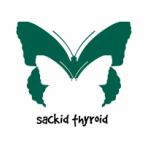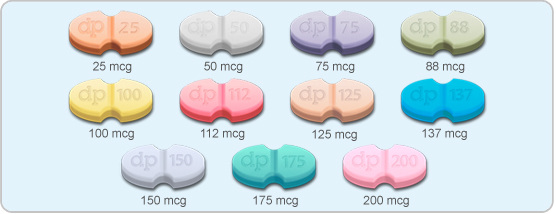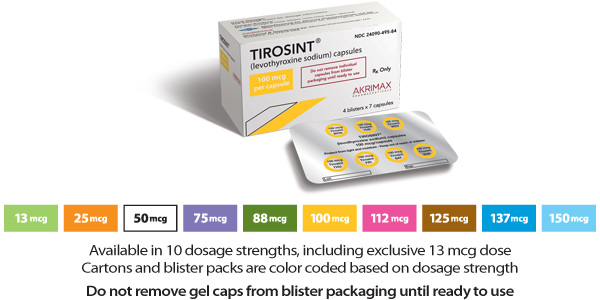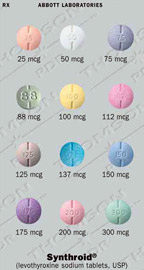|
SYNTHROID
LEVOXYL TIROSINT NATURAL THYROID FDA COMMENTS Q. How would patients know if they are not getting the right dose of thyroid medication? A. Thyroid medications require close monitoring because precise dosing is critical for effective control of hormone levels. Physicians make sure patients get the correct dose of medicine by performing physical examinations and regularly checking thyroid stimulating hormone (TSH) levels through simple blood tests. Patients should also communicate any symptoms to their doctor. Q. What should patients know about choosing or switching thyroid medications? Are generics as effective as brand name medications? A. Patients should talk with their doctors about which drug is right for them. Approved generic thyroid medications are as effective as brand name medications. There have been concerns raised from physicians and patients about varying product performance of levothyroxine sodium, particularly after refills that may involve different products from different manufacturers. But we've found that this may not be related to generic versus brand. Recently, manufacturers (brand and generic) have provided FDA with data revealing that some products lose their potency over time. This loss in potency may account for some of the variable effects with certain products, whether brand or generic. Q. What action has FDA taken to improve the quality of levothyroxine sodium products? A. In 2005, FDA held a public meeting with the American Thyroid Association, the Endocrine Society, and the American Association of Clinical Endocrinologists. Some endocrinologists expressed concern about the performance of these products. As a result, FDA requested product stability data from manufacturers of all approved products manufactured between July 2003 and June 2005. Then in 2006, FDA presented the data at a joint meeting of the Endocrine and Metabolic Drugs Advisory Committee and the Advisory Committee for Pharmaceutical Sciences. The purpose of the meeting was to discuss the potency and stability of marketed levothyroxine products. In October 2007, FDA announced that it is tightening its potency specifications for all levothyroxine sodium to ensure the drug retains its potency over its entire shelf life. |
some thouHgts on natural thryoid
The American Association of Clinical Endocrinologists[7] and the Royal College of Physicians[8]) recommend against the use of thyroid extract for the treatment of hypothyroidism. Concerns include the potential for adverse effects from superphysiological levels of T3 and the absence of long-term safety data from randomized clinical trials. They recommend synthetic levothyroxineas the preferred treatment. Some practitioners refuse to use desiccated thyroid and will try to steer their patients away from it.[9]
Arguments against desiccated thyroid include:
Arguments against desiccated thyroid include:
- Desiccated thyroid preparations have a greater variability from batch to batch than synthetic ones.[9]
- Desiccated thyroid has roughly a 4:1 ratio of thyroxine (T4) to triiodothyronine (T3). In humans, the ratio is 11:1.[10]
- A combination of various ratios of T4 and T3 may not provide benefits over T4 alone. Some controlled trials have shown inconsistent benefits of various ratios of T4 and T3.[11][12]
- The use of desiccated thyroid is usually accompanied with the practice of dosing according to symptoms instead of dosing to achieve "ideal" lab results (e.g. serum levels of TSH). While there is debate as to what the ideal serum levels are, dosing according to symptoms often results in higher dosages. Most endocrinologists are opposed to these higher dosages as there may be risks of hyperthyroidism and osteoporosis.[13]
- The preference for "natural" treatment seems to stem from philosophical belief as opposed to science.[14]




